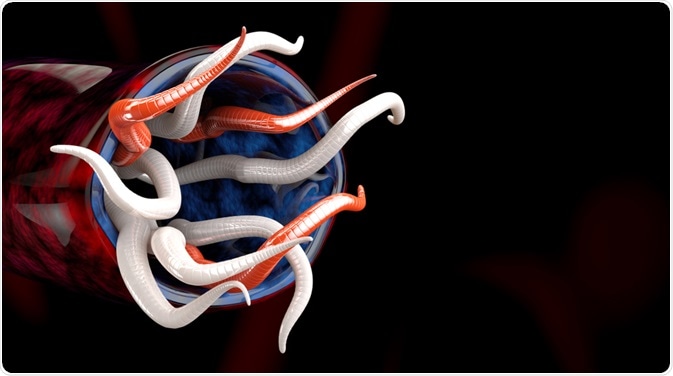Immunotherapy refers to therapy that is given to induce, improve, or suppress the immune system in an effort to treat certain diseases. One experimental form of immunotherapy is the treatment of autoimmune diseases using helminths, which are parasitic worms such as hookworms, threadworms, or whipworms. These worms have evolved to live inside a host organism, on which they depend for nutrients.

Image Credit: Victor Josan / Shutterstock.com
A helminthic infection has been used to explain why the incidence of autoimmune diseases and allergies is lower in underdeveloped countries, yet increasing in industrialized countries.
Early efforts in helminthic therapy
In 2007, an expert in parasite immunology named P’ng Loke met with a 35-year-old man who had deliberately swallowed parasitic worms in an attempt to treat his ulcerative colitis. The men began a research project which was published in the journal Science Translational Medicine in 2010.
Although the man who met Loke was in good health at the time, he had been suffering from intense symptoms of colitis only a few years earlier, including vomiting, diarrhea, abdominal pain, weight loss, and rectal bleeding. In an attempt to discover a cure, the man had read the work of gastroenterologist, immunologist, and parasitologist Joel Weinstock, who had performed pioneering research on the subject of helminthic therapy and treated autoimmune disease by infecting patients with whipworm and hookworm.
The results of Loke’s case study suggested that helminths may relieve the symptoms seen in autoimmune disease by increasing mucus production. Loke examined the man’s medical records from before 2007 and then monitored his health from 2007 onwards.
In 2004, the man had swallowed 500 whipworm eggs, followed by another 1,000 eggs three months later. The eggs hatched and matured inside of his gastrointestinal (GI) tract, where they would have “hooked” their heads into the intestinal lining.
By the middle of 2005, almost all of the man’s symptoms had resolved and he no longer required drugs for his condition, aside from an occasional anti-inflammatory medication to control flare-ups. In 2008, the number of eggs in the man’s stool began to fall; however, as the eggs disappeared, the colitis symptoms returned.
When his symptoms returned, the man swallowed another 2,000 worms and found that his symptoms had almost vanished again a few months later. Colonoscopies were performed, which showed that wherever the worms had settled in his colon, the signs of colitis were either absent or significantly reduced.
During the man's symptom relapse in 2008, the researchers discovered that areas of tissue with active colitis had immune cells that were producing large amounts of the cytokine interleukin 17 (IL-17), but very low amounts of IL-22, which is a cytokine that has been associated with wound healing and mucus production.
Once the worms were reintroduced to the colon, however, there was a significant increase in the production of IL-22. Further analysis showed that areas of tissue where the helminths thrived had an increased level of carbohydrate metabolism, which is required for mucus production.
Loke suggested it was possible that the mucus provides a defensive barrier between the gut and bacteria that stops the bacteria from triggering inflammation and moving into other tissues. As the autoimmune disease is an overreaction of the immune system to harmless or even beneficial substances in the body, experts suspect that colitis occurs as a reaction against bacteria in the gut. Loke believes that when helminths are detected, the body boosts mucus production to defend against the worms and that this excess mucus may also calm an overactive immune system.
Worming your way to good health | Paul Giacomin | TEDxJCUCairns
Other research
A number of rodent studies have shown that helminth infestations can protect the animals against asthma, rheumatoid arthritis, colitis, type 1 diabetes, and food allergies. Additionally, several human studies have also been conducted, the results of which have been promising.
In a 2005 study published in the journal Gastroenterology, Weinstock and colleagues gave 52 colitis patients 2,500 whipworm eggs or a placebo once a fortnight for three months. The team found that symptoms improved in 45% of patients who received the eggs, compared with only 17% of those who received a placebo.
Some researchers now believe that the incidence of conditions such as Crohn's disease is on the rise because today’s children are no longer exposed to infectious pathogens as they were in previous generations. With this in mind, these scientists believe that helminthic therapy is now needed to restore a natural autoimmune balance.
References
Further Reading
Last Updated: May 6, 2021